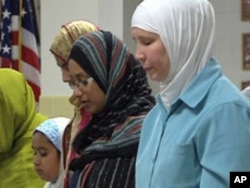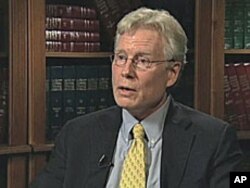The leader of a small U.S. Christian church says he has called off his plan to burn copies of the Quran on Saturday, but his original intention and the public outcry against the construction of an Islamic center in New York City underscore what some see as heightened animosity toward and fear of Muslims and Islam in the United States. Experts say so-called "Islamophobia" exists, but that it appears to be more on the fringes of U.S. society than in the mainstream.
|
Correspondent Michael Bowman discusses whether Americans are "Islamophobic":
|
Nine years after the September 11 terrorist attacks on New York and Washington, fear and distrust of Muslims live on in the United States. Mosques have suffered vandalism, a Muslim cab driver was stabbed after acknowledging his faith, and Pastor Terry Jones insists he will burn the Quran.
Many Muslim-Americans can give first-hand accounts of being targeted for their faith.
Danette Zaghari-Mask says that in her hometown of Orlando, Florida, she was verbally abused by a stranger who said she dresses like a terrorist. "And I was so shocked." A mother of three, she said she worries more for her young children than for herself.
"I am a big girl and I can put up with that kind of hostility, but it is really difficult to explain that to a young child who is developing their sense of self-esteem," said Zaghari-Mask. "We do not want our Muslim-American children to look at the world as 'us' and 'them.' We are all one human race."
A random sampling of opinion in Washington reveals that some people bear animosity toward Muslims and Islam.
Richard Pullen, visiting Washington from the West Coast state of Oregon, said, "To me, it is a cult. You saw what they did on 9/11 (11 Sep 2001). To me, that was taking away our freedom, when we were trying to live here, work here and be peaceful. And they come and attack us."
Most people with whom VOA spoke, however, with had a different outlook.
Maryland resident Todd Heffert said, "I think everybody should celebrate the diversity of America. Christians, Jews, Muslims, Buddhists, Scientology - it really does not matter."
Washington, D.C., resident Shelly Han said, "Most people do not understand what the tenets of Islam are. It is the culture that is associated with Islam that is scary to people. We are definitely at a point where we need more reasonable voices."
Indian immigrant Majit Singha said, "This country welcomes immigrants from all different faiths and countries. There is nothing to fear of a belief or a practice from another culture that is different."
Leading figures of all major faiths gathered here in Washington to defend religious freedom and plea for tolerance.
Brent Walker heads the Baptist [Christian] Committee for Religious Liberty. "We honor God and we honor country by loving our neighbors through seeking religious liberty for everyone," said Walker.
Rabbi David Saperstein has a similar message. "We know what it is like, when people have attacked us verbally, attacked us physically, and others have remained silent. It cannot happen here in America in 2010."
Meanwhile, prominent Muslim-Americans recognize the need to reach out and educate their fellow-citizens.
Ingrid Matson, who directs the Islamic Society of North America, said "I understand that there is a great deal of misunderstanding about Islam and about Muslims in this country. And I do not blame ordinary Americans, who are very busy and do not have a lot of information, for feeling confused and anxious. It is our job to provide better information about what Muslims believe and what Islam is."
At different times, practitioners of other faiths also have faced ridicule and suspicion in the United States, including Mormons, Catholics and Jews. Some observers see the recent flare-up of Islamophobia as a highly-publicized, but temporary deviation from America's historic embrace of religious freedom and diversity.
The head of the religious freedom project at Washington's Newseum, Charles Haynes, points out that the plan to burn the Quran is an isolated act.
"This little church in Florida of 30 members does not represent the United States of America. The United States of America is represented by hundreds, if not thousands, of mosques and Islamic centers in this country that are thriving. Islamic schools where people are free to practice Islam, as almost nowhere else in the world. That is America, and that is the future of America," said Haynes.
A future without hostility toward Islam is one that cannot come soon enough for Muslim-American families.





